The images in the following program are very sensitive and may be as disturbing to viewers as they were to us. However, we have to show the truth of animal cruelty.
HOST:
Welcome to Animal World: Our Co-Inhabitants. On September 15, 2008, Costa Rica’s Independence Day, the country’s Channel 7 broadcast a show about the link between meat eating and global warming. Channel 7 has the largest television audience in Costa Rica and is broadcast via satellite throughout Latin America to millions of viewers. “7 Days” is the station’s (NFT: 7 Días in Spanish is 7 Days) highest rated show which features in-depth information on the latest social trends.
Respected Costa Rican journalist and longtime host of “7 Days”, Marcelo Castro, lent his familiar and trusted presence to the discussion. In an hour-long episode, “7 Days” focused on the important topic of the environmental impact of food. In this well-presented program, we also hear from Mr. Marcelo Galli, a lawyer and the founder of the first vegetarian association in the country, Association for the Promotion of Ethical Vegetarianism. [NFT: La Asociación para la Promoción de la Ética Vegetariana in Spanish means Association for the Promotion of Ethical Vegetarianism]
We now present to you an excerpt from Channel 7’s “7 Days” program entitled, “Love for Meat – Human’s Cruelty.”
Marcelo Castro(m):
They say that if slaughterhouses were made of glass, nobody would eat meat. Indeed, few things are as shocking to human sensitivity as the sacrifice of animals.
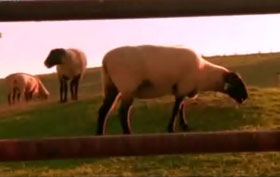 But, there’s more. Cows, pigs and chickens are treated in such a way that makes those living beings be born, grow up and die in a miserable and non-humane way. Because of that, the vegetarian movement is growing around the world, and, of course, here as well in our country. We warn you that the following report contains some cruel scenes that may hurt your feelings.
But, there’s more. Cows, pigs and chickens are treated in such a way that makes those living beings be born, grow up and die in a miserable and non-humane way. Because of that, the vegetarian movement is growing around the world, and, of course, here as well in our country. We warn you that the following report contains some cruel scenes that may hurt your feelings.
Marcelo Galli(m):
The question we should ask is, “Should they suffer?” But human beings very conveniently make the distinction that they are intelligent and can speak; they always mention human attributes that animals do not have. But what would happen if bats set the rules and said, “Okay, the person that can go around trees in the dark at night is going to be the one who will have the right to live.” Then human beings would fail.
Marcelo Castro (m): 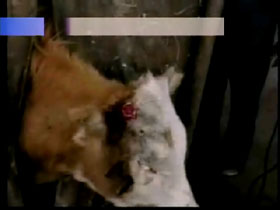
The scenes you are about to see were recorded secretly in the United States. They show the miserable existence of those beings who have to live to satisfy human ambition. In general, these animals grow up in overcrowded conditions without being able to move, with just minimal room. Many are branded with fire and dehorned without anesthetics. The young are separated from their mothers right after being born, etc. In many parts of the world they are submitted to cruel treatment, such as long walks without food or water or they are transported in overloaded trucks in the midst of stress and deprivation. Many die on their way to the slaughterhouse.
Yayo Vicente (m):
I have no doubt, no doubt at all that we have to constantly be more ethical with other beings. There’s no doubt that we human beings are also animals, and somehow we are far more intelligent and that gives us an enormous responsibility. I do believe that we human beings have a duty to other animals.
Marcelo Castro (m):
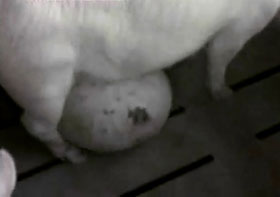 Traditionally, pig farms have been inhospitable, terribly smelly, where the animals have to live without seeing sunlight. It’s quite common that pigs die inside their cages in full view of everyone. Everywhere in the world it’s common to cut their tails and tusks when they are young and these tasks are carried out without anesthetics.
Traditionally, pig farms have been inhospitable, terribly smelly, where the animals have to live without seeing sunlight. It’s quite common that pigs die inside their cages in full view of everyone. Everywhere in the world it’s common to cut their tails and tusks when they are young and these tasks are carried out without anesthetics.
Marcelo Castro (m):
Birds are submitted to de-beaking.
Edgar Espinoza (m):
The ethical part has more to do with consideration for animals as beings that have emotions, as beings that feel and therefore have rights per se, since they are sentient beings. There’s no moral justification that gives human beings the right to abuse an animal that suffers and feels and to not consider those feelings.
Marcelo Castro (m): 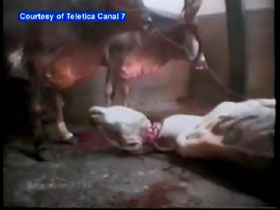
Finally, there is death, which is many times very painful, and other times painless. But, is it that we believe they don’t feel, that they aren’t able to perceive the march toward their own annihilation?
Edgar Espinoza (m):
Many industries deal or allege that they give animals humane treatment by using techniques that lessen their pain. But at a time when we are dealing with such a huge demand for meat, so many animals are handled in the industry that it’s difficult to guarantee that every animal is killed, or processed, I don’t even like to use that word, in a more compassionate way.
Marcelo Castro (m):
The vegetarian diet has an additional benefit. Those who don’t eat animal meat state that in this way they are preserving the planet.
In the 19th century, the world experienced a tragedy, although only a few realized it. Thousands of millions of trees were cut down to create pastures in the campaign to conquer the American West. Their goal was to promote cattle farming. In the same way almost all the Costa Rican forests were depleted. The state used to pay to create pasture, to destroy forests.
Cattle farming today uses one-fourth of the planet’s land that is not covered by ice. A total of 33 percent of this land is used to grow crops that are used to feed animals. As a result, animals take up 70 percent of the arable land on the planet. But these data hide a secret about poor distribution of wealth because not all human beings consume meat.
Legends say that peasants in ancient times used to feed themselves with grains and only used animals to aid in agricultural work. Nonetheless, the rich landlords, from time to time took away these animals to eat them. Thus the poor, without instruments to work with, produced less wheat and suffered from starvation. Thus, the tradition of condemning meat consumption arose, and as time passed the cow became a sacred animal.
Today, the situation has changed little. A hectare of land might feed fourteen people with beans, rice, legumes and vegetables. But the same hectare just feeds two people if it is used to produce meat and milk.
Edgar Espinoza (m):
A huge amount of agricultural production is precisely allotted to feed cattle for the meat and dairy industries. So, if the land was free from this, if the United States’ meat industry was reduced by 10 percent, enough land would be freed up to feed 60 million people. That is approximately Great Britain’s population.
HOST:
We’ll return shortly to Animal World: Our Co-Inhabitants and today’s show featuring a documentary program from Costa Rica’s Channel 7 entitled, ““Love for Meat – Human’s Cruelty.” Please stay tuned to Supreme Master Television.
HOST:
Today’s show features an in-depth documentary on entitled, “Love for Meat – Human’s Cruelty” from the Costa Rican Channel 7 television program, “7 Days.”
Marcelo Castro (m):
Forest destruction is just one part; another is pollution. According to vegetarians, meat production inflicts more harm to the environment.
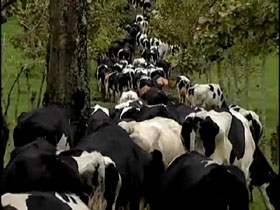 The most relevant of the harmful things from the 21st century is global warming, which is responsible for the ice caps melting and for the extinction of animal and plant species. FAO (Food and Agricultural Organization), an organization from the United Nations published a study called Livestock’s Long Shadow. In this report, experts state that raising cattle contributes more to the planet’s global warming than transportation, which produces, according to the study, 13 % of greenhouse gases and cattle farming 18%.
The most relevant of the harmful things from the 21st century is global warming, which is responsible for the ice caps melting and for the extinction of animal and plant species. FAO (Food and Agricultural Organization), an organization from the United Nations published a study called Livestock’s Long Shadow. In this report, experts state that raising cattle contributes more to the planet’s global warming than transportation, which produces, according to the study, 13 % of greenhouse gases and cattle farming 18%.
Marcelo Galli (m):
This means that a carnivore who walks contributes to 18% of greenhouse gases while a vegetarian in a car contributes to 13%.
Marcelo Castro(m):
We living beings are huge producers of methane. And this gas, even when it is produced in lower amounts than CO2, is 23 times stronger than CO2 [over a 100 year period, 72 times over a 20 year period] with regard to heat trapping.
It produces between 15 to 17 percent of the greenhouse effect; too much cow manure on a small amount of land.
Edgar Espinoza (m):
A cow produces the same amount of excrement as that produced by twenty to forty human beings. Then, multiply this by the number of cattle that are available and this is an exorbitant amount.
Marcelo Castro (m):
Vegetarians state that the human body is not made to feed on meat. It was an accident in our lives and it’s better to be without it.
Marcelo Galli (m):
Cancer rates provided by vegetarians, especially vegans, those of us who do not consume milk or eggs but a lot of fruits and vegetables, whole grains… so, we eat a huge variety, but healthy things, we have lower cancer rates, lower disease rates, fewer cardiovascular diseases. We have far lower diabetes rates. We have less incidence of dementia.
Marcelo Castro (m):
This is the topic that concerns the most to those who are watching. Can a vegetarian diet give me all the nutrients, especially protein?
Woman: Norma Meza Nutrition School UCIMED (Medical Science University)
The recommendations given by the American Dietetic Association indicates that a vegetarian diet is adequate from a nutritional perspective as long as, there is a good planning of meals.
Marcelo Castro (m):
Norma Mesa runs the Faculty of Nutrition at the University of Medical Sciences (UCIMED).
Woman:
Many studies have demonstrated that the vegetarian diet, by being plentiful in antioxidants, vitamins and minerals, it has been shown that those people who follow a vegetarian diet possess a minor risk of suffering from colon cancer, different cardiovascular diseases, digestive diseases, cardiovascular infirmities. This consists of a diet far lower in cholesterol, lower in saturated fat.
Marcelo Castro (m):
Vishnú Restaurant show that this is a simple way to serve food. Besides being very nutritious it turns out to be very pleasant. This is meat, not animal but vegetable-based. This one is also ground meat, also vegetable-based. When well-prepared, they become first-class main courses.
Guillerno Díaz (m):
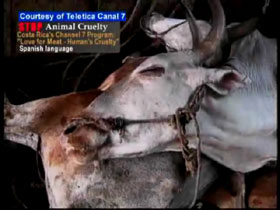 All those who come here receive the same treatment, the same consideration, the same respect. Basically, here, you’ll have a table, a person with a suit on, another person with more simple clothes, but everybody who visits us, everybody enjoys our meals the same.
All those who come here receive the same treatment, the same consideration, the same respect. Basically, here, you’ll have a table, a person with a suit on, another person with more simple clothes, but everybody who visits us, everybody enjoys our meals the same.
We have customers that you see almost every day. Almost every day there are people that come one day and then return a week later. We have customers that are not vegetarians but they try the alternative diet.
Today they come to eat here, tomorrow they’ll go to another place and then they’ll come back. Then it becomes like family because we know our customers.
Marcelo Castro (m):
In our country, there are movements that propose vegetarianism as a lifestyle that could bring about health. It’s said that it is a complete diet because all the nutritients the body needs are in the plant kingdom. Aside from Vishnú Vegetarian Restaurant that was mentioned in this report, there is a restaurant that sells vegetarian food in Barrio Escalante and its name is Casa Sana.
Marcelo Castro (m):
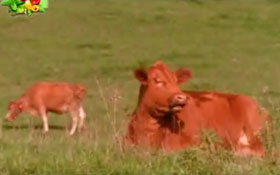
Don’t hurt animals, protect the environment, improve your health. Those are three reasons to realize the millennium revolution. Quit eating meat. What do you think?
HOST:
Those are indeed good reasons for adopting the plant-based diet. We thank Mr. Marcelo Castro, Channel 7 and “7 Days” for this insightful look at the ethical and environmental consequences of meat-eating and the many advantages of the vegetarian lifestyle.

